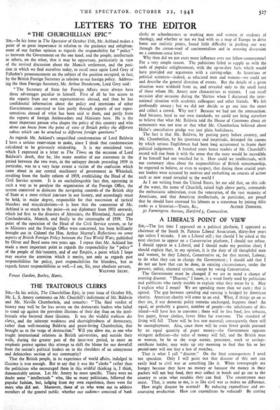THE TRAITOROUS CLERKS
Sm,—In his article, The Churchillian Epic, in your issue of October 8th, Mr. L. S. Amery comments on Mr. Churchill's indictment of Mr. Baldwin and Mr. Neville Chamberlain, and remarks: " The final verdict of history may well be far less severe on the democratic leaders who failed to stand up against the prevalent illusions of their day than on the intel- lectuals who fostered those illusions. It was the wishful trahison des clercs, and the inherent weakness and shortsightedness of democracy, rather than well-meaning Baldwin and peace-loving Chamberlain, that brought us to the verge of destruction." Will you allow me, as one who taught international relations in British universities, and outside their walls, during the greater part of the inter-war period, to enter an emphatic protest against this attempt to shift the blame for our downfall from the nation's political leaders on to the shoulders of an anonymous and defenceless section of our community?
That the British people, in its experience of world affairs, indulged in illusions is true enough. But to say that it was the "clerks" rather than the politicians who encouraged them in this wishful thinking is, I think, demonstrably untrue. Let Mr. Amery be more specific. There were no doubt some " intellectuals " who, like so many politicians, followed the popular fashion, but, judging from my own experience, there were far more who did not. Moreover, those of us who went out to address members of the general public, whether our audience consisted of bank
clerks or schoolmasters or working men and women or students of theology, and whether or not we had with us a map of Europe to drive home our realistic points, found little difficulty in pushing our way through the cotton-wool of sentimentalism and in arousing discussion on a common-sense level.
Why then did we not exert more influence over our fellow-countrymen? For a very simple reason. The politicians failed to supply us with the tools of popular enlightenment, with the up-to-date facts which would have provided our arguments with a cutting-edge. As historians or political scientists—indeed, as educated men and women—we could see and describe the general direction of events. But the details of a given situation were withheld from us, and revealed only to the small band of those whom Mr. Amery now characterises as traitors. I can recall occasion after occasion during the 'thirties when I discussed the inter- national situation with academic colleagues and other friends. We felt profoundly uneasy ; but we did not decide to go out into the street and collect a crowd. Why not ? Because we had not the ammunition. And because, loyal to our own standards, we could not bring ourselves to believe that what Mr. Baldwin told the House of Commons about air armaments was not true or that what Mr. Chamberlain believed about Hitler's consultative pledge was just plain foolishness.
The fact is that Mr. Baldwin, by putting party before country, and Mr. Chamberlain, by his ignorance and ineptitude, deranged the canons by which serious Englishmen had been long accustomed to frame their political judgements. A hundred years hence readers of Mr. ChUrchill's record will rise from it with the sense that the story would be incredible if he himself had not vouched for it. How could we intellectuals, with our customary ideas about the responsibilities of British statesmanship, be expected to believe, or even to suspect, that during these crucial years our leaders were actuated by motives and embarking on courses of action such as now stand revealed to the world ?
As. I am writing from the United States, let me add that, on this side of the water, the name of Churchill, raised high above party, commands the enthusiastic admiration, even the veneration, of the vast majority of Americans, and that American intellectuals, in particular, are proud that he should have 'crowned his labours as a statesman by joining their
ranks as a historian.—Yours, &c., ALFRED ZIMMERN. 3o Farmington Avenue, Hartford .5, Connecticut.


































 Previous page
Previous page